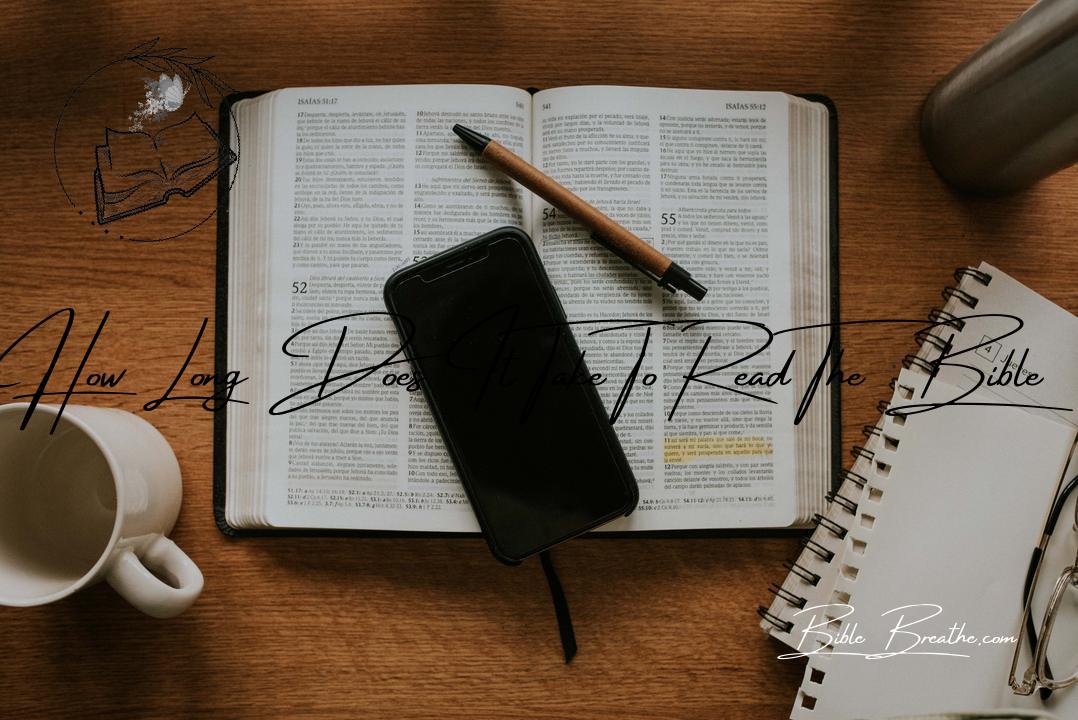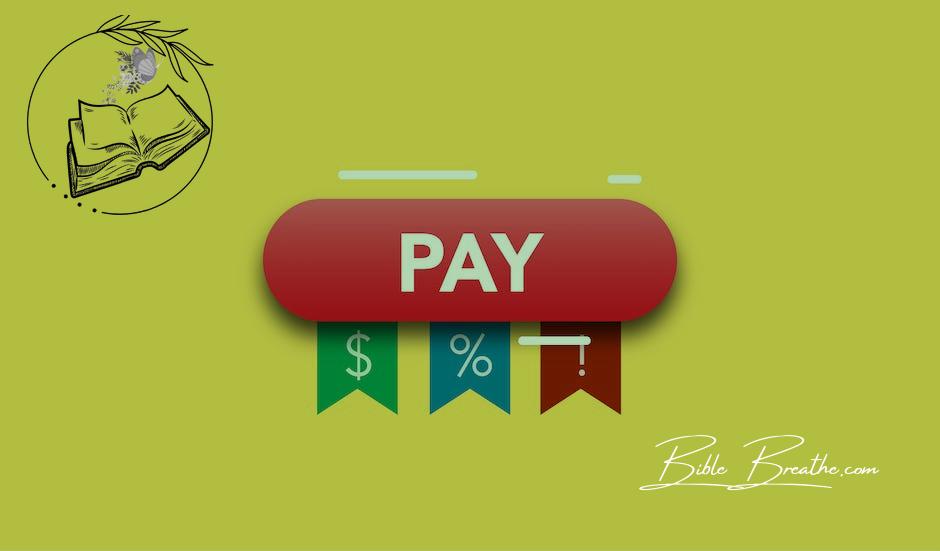How long does it take to read the Bible?
Now, that’s a question I’ve heard buzzing among the faithful and those just dipping their toes into the waters of spirituality.
Picture this: the Bible is like a grand adventure, a journey of the soul.
But when you hear folks talk about how long it takes, you might wonder if it’s a sprint or a marathon.
Let’s unravel the mystery, my friends.
This isn’t a race; it’s a profound exploration of faith.
Some think it’s a months-long quest, while others hope for a quick spiritual snack.
In this chat, we’re breaking down the myths and setting the record straight about Bible reading.
We’ll talk about why this book is so important, and we’ll clarify the time aspect.
Whether you’re diving into a Bible reading plan for spiritual growth or just curious, let’s journey through scripture, chapter by chapter.
The Bible’s a treasure trove, and the time invested is worth every moment.
📖✨
Key Takeaways
- Daily Bible Reading Habit: Reading the Bible is not about how quickly it can be completed but rather about making it a daily habit. Consistent engagement with the Word of God allows for a deeper understanding and a more profound impact on one’s life.
- Transformative Power of the Word: The Bible has the power to transform lives. It offers guidance, wisdom, and spiritual nourishment. Regular reading and reflection on its teachings can lead to personal growth, spiritual insight, and a closer relationship with God.
- Embarking on the Journey: Reading the entire Bible cover to cover is a valuable undertaking. It provides a comprehensive view of God’s revelation and the unfolding of His plan. While it may take time, the journey is rewarding and offers a deep appreciation for the richness of Scripture.
- No Set Timeframe: There is no fixed timeframe for reading the Bible. The pace at which one reads can vary widely. It’s more important to read with understanding and reflection rather than rushing through it.
- Encouragement to Begin: Whether one aims to read the Bible in a year or over a more extended period, the key is to start. Beginning the journey of reading the Bible is a step toward spiritual enrichment and a deeper connection with God.
In conclusion, the time it takes to read the Bible is not as important as making it a daily habit and experiencing the transformative power of God’s Word.
Embarking on the journey of reading the Bible cover to cover is a valuable endeavor, and it’s never too late to start.
Navigating the Bible’s Time Frame
Photo modified by BibleBreathe.com. Original photo by Lum3n on Pexels
Ever wondered about the time it takes to journey through the Bible, cover to cover?
Is it a sprint, a marathon, or something in between?
Well, let’s cruise through this intriguing question and unveil the timeline for this spiritual odyssey.
The Bible: More Than Just a Book
Before we get into the clock and calendar, remember that the Bible isn’t your typical novel.
It’s a collection of sacred tales that hold immense significance for countless souls across the globe.
People come to it with all sorts of intentions and at varying speeds.
For some, it’s a personal challenge, a faith-filled expedition.
It’s like setting out on a cross-country road trip, with each chapter and verse a scenic stop, offering insight, wisdom, and guidance.
“Thy word is a lamp unto my feet, and a light unto my path.” – Psalm 119:105 (KJV)
Others prefer a more leisurely pace, savoring each verse like a gourmet meal.
It’s akin to a peaceful stroll through a lush garden, pausing to admire each blossom’s beauty and inhale its fragrance.
The Clock and Calendar of Bible Reading
Now, let’s tackle the big question: How long does it take to read the whole Bible?
Well, that depends on your reading speed, dedication, and the depth of your exploration.
Some zealous souls can zoom through it in as little as 72 hours, while others stretch it out over a year or more.
It’s not about rushing through pages but letting the teachings soak into your soul, like a slow-cooked dish infusing flavor into every bite.
Man shall not live by bread alone, but by every word that proceedeth out of the mouth of God.” – Matthew 4:4 (KJV)
If you’re looking for structure, there are Bible reading plans to the rescue.
These plans break down readings into daily portions, ensuring you journey through the Old Testament, New Testament, and all that’s in between.
In the grand scheme of things, the time you spend reading the Bible matters less than the impact it has on your life.
Whether you sprint through it like a sports car or savor it like a fine wine, what truly counts is the spiritual growth, wisdom, and understanding you gain.
So, my friend, the question isn’t just about how long it takes but whether you’re ready for this faith-filled adventure.
Will you embark on this journey of discovery and growth?
Unraveling the Mystery: How Long Does It Take to Read the Bible?
Photo modified by BibleBreathe.com. Original photo by SHVETS production on Pexels
Ever wondered how long it takes to dive into the depths of the Bible from Genesis to Revelation?
Well, it’s not as simple as measuring it by minutes or pages.
This is more like a spiritual adventure than a quick read.
The Bible Journey
Think of reading the Bible as an epic journey, not a sprint.
The time it takes can vary depending on a few things.
1. Your Reading Speed
Are you a speedy reader or someone who savors each word like a gourmet meal?
The Bible can accommodate both styles.
Man shall not live by bread alone, but by every word that proceedeth out of the mouth of God.” – Matthew 4:4 (KJV)
2. Bible Versions Matter
There’s more than one flavor of the Bible out there.
Some are like a modern novel, and others sound like Shakespeare.
Your choice of version can affect your reading pace.
3. Having a Reading Plan
Think of a reading plan like a treasure map.
It helps you navigate your way through this incredible journey.
It adds structure and keeps you on track.
4. The Audio Bible Experience
In our tech-savvy world, you can listen to the Bible while doing other tasks.
It’s like having a spiritual sidekick during your daily commute or chores.
Faith cometh by hearing, and hearing by the word of God.” – Romans 10:17 (KJV)
Why Don’t More Christians Read the Bible Daily?
It’s a bit puzzling, isn’t it?
The Bible is a treasure chest of wisdom, yet not all Christians read it daily.
Let’s unpack why that might be:
1. Church Priorities
Some churches may not emphasize daily Bible reading, focusing more on group activities.
2. Church Attendance Isn’t Enough
Attending church is crucial, but it’s like expecting a few meals a week to sustain you for a month.
Personal Bible study is your daily bread.
3. Depending on Others for Spiritual Nourishment
While PASTORs and priests are essential, personal engagement with the Bible deepens your understanding.
It’s like outsourcing your meals when you have a feast at your fingertips.
4. The Enemy’s Strategy
Spiritual battles are real.
The devil would rather keep you away from the Word of God, where you find strength and wisdom to resist temptation.
In conclusion, the time it takes to read the Bible is a journey, not a race.
It’s about the quality of your engagement, not the quantity of pages.
So, how long does it take?
The clock is just a part of the equation.
Your commitment and the path you take on this profound journey matter most.
“Thy word is a lamp unto my feet, and a light unto my path.” – Psalm 119:105 (KJV)
The Abundant Blessings of Consistent Bible Reading
Photo modified by BibleBreathe.com. Original photo by Monstera Production on Pexels
Have you ever wondered why some folks make reading the Bible a regular part of their lives?
Is there more to it than just ink on pages?
Let’s dig deep into the treasure chest of blessings that await those who embrace the habit of consistent Bible reading.
Strengthening Your Connection with God
Picture your relationship with God as a well-tended garden.
To thrive, it needs constant care and nourishment.
Regular Bible reading is like tending to this garden.
It’s about spending quality time with the Creator, diving into His wisdom, and opening your heart to His guidance.
“Draw nigh to God, and he will draw nigh to you.” – James 4:8 (KJV)
Reading the Bible regularly isn’t just about gathering knowledge; it’s about forging a deeper bond with the divine.
It’s akin to having heart-to-heart conversations with a dear friend, except this friend is the wellspring of all wisdom and love.
Unveiling Profound Biblical Insights
The Bible is an ocean of wisdom, with each verse holding layers of meaning.
Regular reading is like diving into the depths of this ocean.
It’s about unearthing hidden treasures and grasping the profound teachings that can shape your life.
Similar to studying a subject in school, consistent Bible reading allows you to fathom the intricacies of its teachings.
It’s not just skimming the surface; it’s delving deep and gaining insights that can revolutionize your perspective.
For the word of God is quick, and powerful, and sharper than any twoedged sword, piercing even to the dividing asunder of soul and spirit, and of the joints and marrow, and is a discerner of the thoughts and intents of the heart.” – Hebrews 4:12 (KJV)
Safeguarding Against False Teachings and Worldly Influences
In a world brimming with diverse beliefs and ideologies, consistent Bible reading serves as a shield against false teachings and worldly influences.
It’s like having a compass that unfailingly points north, helping you stay on the right path.
“Beware lest any man spoil you through philosophy and vain deceit, after the tradition of men, after the rudiments of the world, and not after Christ.” – Colossians 2:8 (KJV)
By immersing yourself in the truths of the Bible, you become equipped to discern what aligns with God’s Word and what doesn’t.
It’s a safeguard for your faith, preventing you from being swayed by the ever-shifting currents of the world.
In conclusion, the rewards of consistent Bible reading are boundless.
It’s not just about the time you dedicate; it’s about the spiritual growth, wisdom, and protection it bestows upon your life.
So, my friend, are you ready to reap these abundant blessings by making consistent Bible reading a part of your journey?
Navigating the Bible Reading Journey: Practical Tips
Photo modified by BibleBreathe.com. Original photo by Anna Shvets on Pexels
Reading the Bible is more of a delightful, soul-nourishing marathon than a sprint.
As you step onto this incredible path, here are some down-to-earth tips to help you make the most of your journey.
1. Set Aside Sacred Daily Time
Imagine your daily Bible reading as a divine appointment.
Just like you carve out time for meals and rest, make room for your encounter with the Scriptures.
It might be during your morning coffee or the tranquility of the evening.
What’s crucial is consistency.
In the morning, O Lord, you hear my voice; in the morning I lay my requests before you and wait expectantly.” – Psalm 5:3 (KJV)
2. Pick an Easy-to-Digest Version
The Bible has many flavors, and some might sound a tad old-fashioned.
To begin, go for a version that talks to you in clear, everyday language.
Think of it like choosing a book with a writing style that clicks with you.
3. Start from Genesis and Journey to Revelation
The Bible is like a grand, interconnected story.
Reading it sequentially offers a sense of the bigger picture.
Begin at Genesis to grasp the awe-inspiring tale of creation, move through the Old Testament to understand the historical context, and then dive into the New Testament to walk alongside Jesus.
In the beginning, God created the heaven and the earth.” – Genesis 1:1 (KJV)
4. Embrace the Power of Audio
Life can be a whirlwind, and sometimes sitting down to read may not fit the schedule.
That’s where audio readings swoop in to save the day.
Listen to the Bible while you commute, exercise, or tackle chores.
It’s a practical way to soak in the Word.
5. Trust God for Understanding
Reading the Bible isn’t just about flipping pages; it’s about seeking spiritual wisdom.
Trust that God will shed light on the text as you journey through it.
Pray for insight and guidance, and be open to the wisdom that flows from Scripture.
Trust in the Lord with all thine heart; and lean not unto thine own understanding.” – Proverbs 3:5 (KJV)
As you ponder how long it takes to read the Bible, remember that the journey is just as significant as the destination.
It’s not about racing through chapters but allowing the words to mold your heart and mind.
Let these practical tips be your compass as you embark on this enriching voyage through the pages of the Holy Scriptures.
Frequently Asked Questions (FAQs) About How Long Does It Take To Read The Bible
How many hours does it take to read the Bible?
The time it takes to read the entire Bible varies based on reading speed.
On average, it can take about 70-90 hours to read the Bible cover to cover.
Is it better to read the Bible in order or jump around?
Whether to read the Bible in order or jump around depends on your goals.
Reading in order provides a chronological understanding, while jumping around allows you to explore specific themes or books.
Both approaches are valid; choose the one that best suits your learning style and objectives.
How can one stay consistent in reading the Bible daily?
Consistency in daily Bible reading can be achieved through setting a specific time, creating a reading plan, using devotionals, and seeking accountability or support from a community or study group.
Additionally, applying reflections on readings and keeping a journal can aid in comprehension and sustained engagement.





